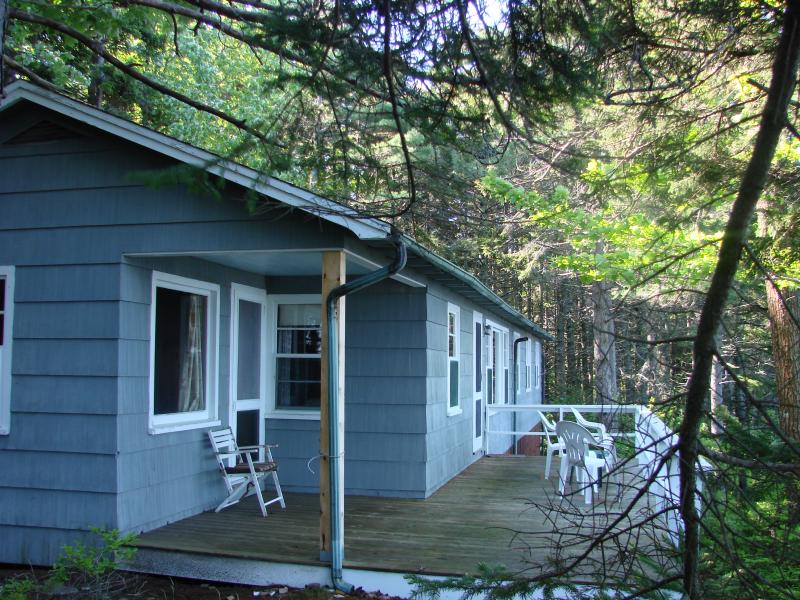'The right woman at the right time'
The morning of June 9 was sunny and breezy in Southport. Gulls and a bird of prey were flying over the tidal area that was once Rachel Carson's view from her back deck.
Other birds were calling in the woods where the famous author built the cottage in the 1950s.
It was a week shy of 50 years since The New Yorker started publishing excerpts from "Silent Spring," on June 16, 1962. Carson's book, which is credited with sparking the environmental movement in the U.S., was released that September.
The book got the attention of President John F. Kennedy and set off a series of political developments that, by the early 1970s, got DDT and several other pesticides banned. In 2007, thanks in part the ban on DDT, the bald eagle came off the federal list of endangered and threatened species.
The top of the food chain was not a good place to be when pesticides became popular. Not only were birds of prey exposed in the environment, they got more of the chemicals from their meals – creatures whose daily diet had also been exposed. "Silent Spring" called attention to incidents of great death and failure to reproduce among several species of birds, in and outside the U.S.
Carson's book was "the Paul Revere's ride" for the dangers the chemicals posed, Maine Audubon Executive Director Ted Kossman said. "She was the right woman at the right time."
The whole episode was a public relations nightmare for the chemical industry, and became a lesson in what not to do, Peter Larsen, senior research scientist emeritus at Bigelow Laboratory in Boothbay Harbor, said.
"The more they attacked this woman, the more sympathetic she became, and the more evil they looked," Larsen said. Companies now try to take a positive approach. Fossil fuel companies' television commercials talk of the U.S. being able to rely on itself, and of Americans being owners of the companies by virtue of their retirement plans.
The popularity of Carson's earlier books also helped draw interest and lend credence to "Silent Spring," biographer William Souder said. His book "On a Farther Shore: The Life and Legacy of Rachel Carson" is due out in September.
Her books were already in many American living rooms, and the disturbing scenes she described in "Silent Spring" hit with resonance, Souder, a 2005 Pulitzer Prize nominee, said. "Carson certainly stirred up a hornet's nest."
"Silent Spring" was also eminently readable. Had it appeared in a science journal, it might well have sparked more research, but the topic might not have spilled as quickly or widely across the mainstream media. Instead, Carson wrote it for everybody.
"It was so well-written and so poetic, that everyone could appreciate it without knowing a lot of terminology," Paul Mayewski, director of the University of Maine's Climate Change Institute, said.
Although the specific threats have changed – such as the massive oil leak into the Gulf of Mexico in 2010 – environmental experts say Carson's call to protect nature when interacting with it is as relevant today as it was when she wrote the book.
Fifty years after her groundbreaking book, and 48 years after Carson's death, some of the people around Carson when she was writing "Silent Spring" think she'd take a mixed view of the state of the environment today.
"There are things that are heartening, but on the whole it's not very good," Carson's grandnephew and adopted son Roger Christie said. "One of the things that tends to go overlooked is that the pesticides were what she was writing about at that time, but it wasn't the only thing she cared about. Certainly, now there would be all sorts of other issues concerning her."
Stanley Freeman Jr.'s family shared their Southport summers with Carson and Christie. When the oil disaster unfolded in the Gulf of Mexico two years ago, Freeman Jr. thought of Carson's "foreboding of disaster."
"And I'm sure Rachel would be aghast with all the plastic junk that's filling the oceans and choking the fish," Freeman said.
"I think she'd be happy with how much environmentalism is in the con-sciousness of most people on the planet," Freeman's daughter Martha Freeman said. "But she'd also see the challenges we still have, to make people see that everything on the planet is connected."
"She'd still just be teaching, through her writings," Martha Freeman said.
Address
United States























